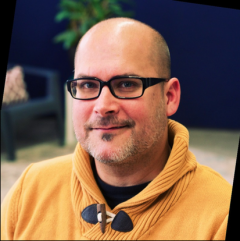By Nehaa Bimal
Future-Thinking and Forward Looking: Future EDge’s Indigenous Entrepreneurship Program on Supporting Indigenous Entrepreneurs on their Startup Journey
CU Future EDge’s Indigenous Entrepreneurship Program (IEP) is a four-to-five-week leadership program developed by CU Future EDge and the Innovation Hub at Carleton University.
Not only does IEP provide training on leadership development, finance, and project management, amongst other business skills, but it also plans to provide support for Indigenous entrepreneurs after the program has completed.
IEP Director Richard Tuck is a Métis serial entrepreneur who has helped launch around 150-200 organizations, from environmental non-profits to multinational tech companies.

“The Indigenous Entrepreneurship Program looks at social entrepreneurship through an Indigenous lens through talking to Elders, Knowledge Keepers, Indigenous community members and entrepreneurs,” said Richard.
“We are combining Indigenous ways of knowing and being with the new entrepreneurial process.”
Future EDge’s Indigenous Entrepreneurship Program and the New Entrepreneurial Process
According to Richard, the new entrepreneurial process which is featured in the Indigenous Entrepreneurship Program is more efficient. Instead of relying on a business plan, new business owners are advised to invest small amounts of money into their companies as a tester.
“This process increases the chance of success while decreasing the amount invested in things that fail,” said Tuck.
Some of the Indigenous entrepreneurs who have joined IEP are first-time business owners.
They are often inspired by their families or Indigenous heritage to launch their start-ups, like Daphne March, founder of the ShaMaSha Centre, an Indigenous wellness retreat. Others help fill a gap in the industry, such as Tye Galley and Cody Lystiuk who launched Emergency Rush Logistics, a First Nation logistics company dealing in emergency shipments.
For them, this is the more sustainable, cost-effective way forward for their start-ups, ensuring a higher success rate.
Future-Thinking and Forward Looking: IEP Embraces the Seventh Generation Principle
According to Richard, who was the 2021 Sprott Alumni Good Business Award winner and a 2001 graduate of Carleton’s Bachelor of International Business program, CU Future EDge’s IEP and Carleton’s Innovation Hub are both impressive because they are “future thinking.”
Their vision of entrepreneurship looks to the future and this aligns with the decision-making process in some Indigenous communities called the Seventh Generation Principle. According to this principle, people should consider the impacts decisions made in the present will have on the next seven generations.
Barbara Dumont-Hill was the Elder-in-Residence at the final presentations where the IEP’s Indigenous entrepreneurs presented their businesses after the program’s conclusion. She led the attendees in a prayer which mentioned the importance of the Seventh Generation Principle.
“We would learn what people from seven generations past knew. This was knowledge that would help us sustain and care about the seven generations to come. Today, there is a worry and a sadness in our hearts that there might not be resources for the next seven generations,” she said.
CU Future EDge’s Indigenous Entrepreneurship Program thus focuses on sustainability, with sessions on environmental entrepreneurship and innovation. The program is sponsored by Eco Canada, which works with and for environmental professionals in regards to job creation and wage funding.

In that sense, the program has helped Indigenous entrepreneurs like Jordan Dooley, the founder of Vearthy which sells sustainable textiles, learn more about the intersection between business and environmentalism.
CU Future EDge’s Indigenous Entrepreneurship Program Provides a Support System for Indigenous Entrepreneurs
Cohort based programs are difficult for Indigenous entrepreneurs who do not have the luxury of devoting a majority of their time to the five-week process since many of them have full time jobs and are single parents.
“There are a bunch of barriers to completing a program like this. The Indigenous Entrepreneurship Program navigates that arena so that we can get Indigenous entrepreneurs the resources and ability to make it to the next stage of their business process,” said Richard.
The program allows participants to have access to mentorship and coaching via Carleton’s Innovation Hub for up to four months after the program’s completion. They are also awarded a professional certificate in Indigenous entrepreneurship from CU Future EDge.
IEP’s goal is to build a community network and internal support system where Indigenous entrepreneurs can learn from each other and grow their businesses together.